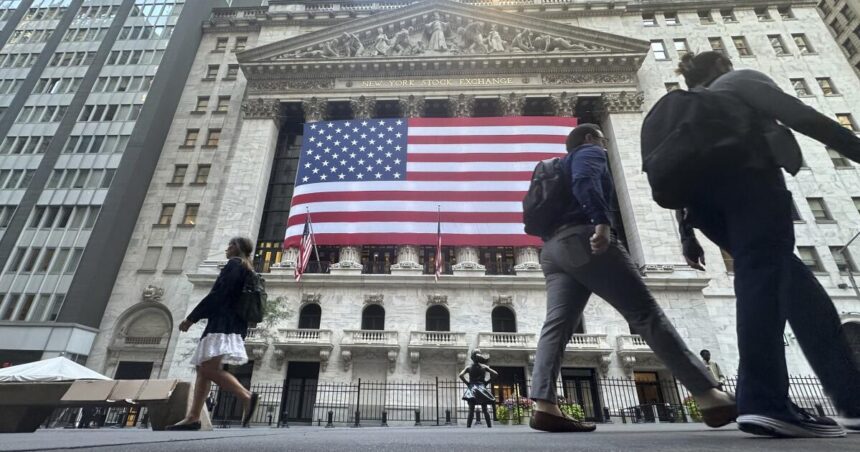Trading was quiet on Monday as Wall Street prepared for the most anticipated Federal Reserve meeting in years, but the Dow Jones Industrial Average set a record.
The Dow rose 0.6%, surpassing the record high it reached a few weeks ago, while the more broad Standard & Poor’s 500 index, which is widely followed on Wall Street, rose 0.1%, to within 0.6% of its own record set in July.
The Nasdaq Composite shed 0.5% as big tech stocks and other market superstars gave back some of the big gains of recent years.
Most stocks rose on Wall Street, led by a 5.1 percent gain in Oracle Corp. The software company extended a strong run of results that began last week with a better-than-expected profit report.
Alcoa surged 6.1% after it said it would sell its ownership stake in a Saudi Arabian joint venture to Saudi Arabian Mining for $950 million in shares and $150 million in cash. But losses in some influential Big Tech stocks held the index back, including Apple, down 2.8%, and Nvidia, down 1.9%. These are some of the most influential stocks on the market, as they are among the largest by market capitalization.
Stock indexes are making a jagged, scary move toward records. Worries about the U.S. economy and other turmoil in global markets briefly pushed the S&P 500 index nearly 10% below its all-time high last month, but excitement over upcoming interest rate cuts has the index one day away from a record.
In the bond market, Treasury yields fell ahead of a Federal Reserve meeting on Wednesday where the central bank is expected to cut its key interest rate for the first time in four years.
The only question is how much economic relief the Fed will provide. Traders are shifting more of their bets toward a larger-than-usual half-percentage-point move, according to data from CME Group. They see a 63% chance that the Fed will cut rates by more than a quarter-point, up from 50% on Friday and just 30% a week ago.
The difference between a half-point cut and a quarter of a percentage point may sound academic, but it could have far-reaching effects: Cutting interest rates relieves pressure on the economy, but it could also lead to more inflation.
The Fed has been keeping its key interest rate at a 20-year high in hopes of slowing the economy enough to curb high inflation. Inflation has fallen significantly from a peak in the summer two years ago, and the Fed has said it can focus on propping up the slowing job market and economy. Some critics say they have acted too late and could increase the chance of a recession.
A Fed rate cut of just half a percentage point would probably be the best case scenario for stocks in the near term, according to Michael Wilson and other Morgan Stanley strategists, but only if the central bank can convince investors that recession fears or other factors won’t force it to cut rates more than usual.
The most important thing over the next three to six months will be how well the job market holds up, Wilson said. If employment worsens, stocks could fall regardless of whether the Fed cuts interest rates by a half or quarter percentage point on Wednesday.
In the bond market, the yield on the 10-year Treasury note fell to 3.62% from 3.66% late on Friday, while the yield on the two-year note fell to 3.56% from 3.59%, moving more in line with the Fed’s expectations.
That came despite morning reports that manufacturing in New York state had returned to growth, surprising economists who had expected another month of contraction in a sector of the economy hard hit by high interest rates.
On Wall Street, Carl Icahn’s Icahn Enterprises rose 14.5% after the company said a U.S. judge had dismissed a proposed class action lawsuit against it based on claims by the research firm that it was probing companies for financial improprieties and seeking to profit from falling stock prices. Prices are falling.
Fertilizer producer Mosaic fell 3.6% after it said electrical failures at its mines and Hurricane Francin would reduce its potash and phosphate production this quarter.
Overall, the S&P 500 rose 7.07 points to 5,633.09. The Dow Jones Industrial Average added 228.30 points to close at 41,622.08 and the Nasdaq Composite Index fell 91.85 points to 17,592.13.
Overseas stock indexes were mixed amid mostly muted performance across Europe and Asia. Hong Kong’s Hang Seng rose 0.3% after data released over the weekend showed China’s economy slowed further in August.
Markets in Japan, mainland China and South Korea were closed for public holidays.
Cho is a contributing writer for The Associated Press. Associated Press writers Matt Ott and Zimo Zhong contributed to this report.









